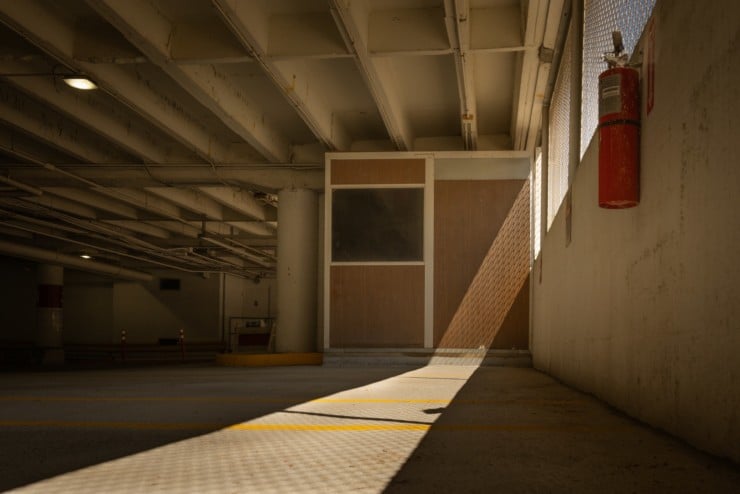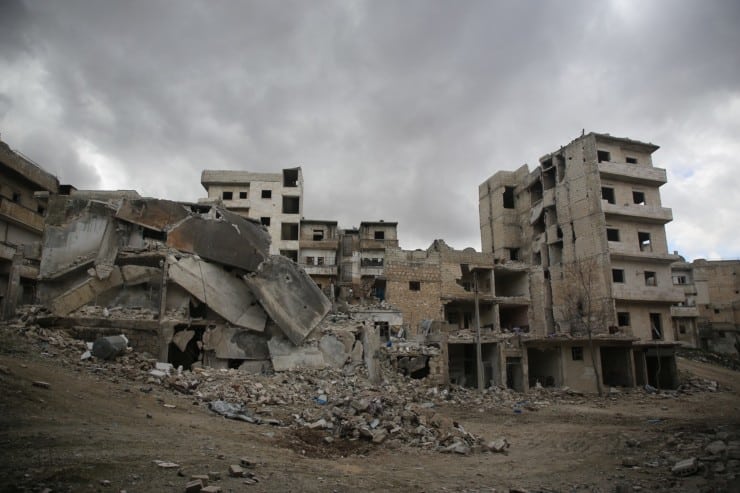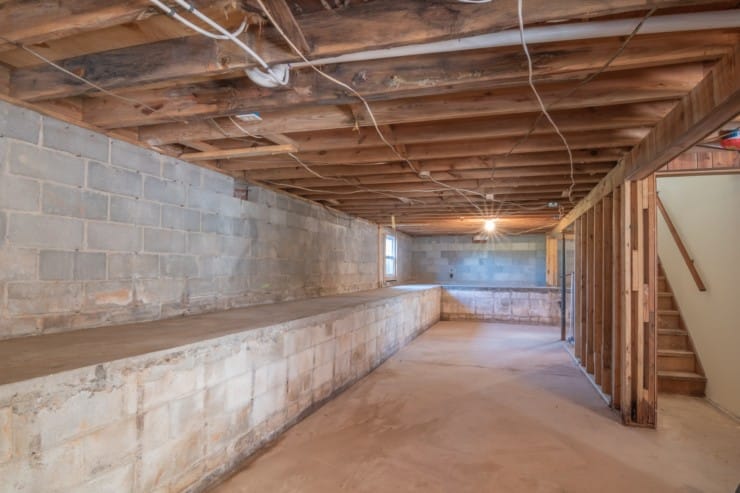Can a Basement Protect You From a Nuclear Attack?
Nuclear warfare was a concept unimaginable to humans until 2018. In January, the missile defense system in Hawaii issued an alert, leaving residents unsure of where to seek safety.
It spurred confusion in the city, and people were frantically running around. Given that it is one of the hottest tourist destinations, the guests peeked from the windows to fathom the situation.
This was a false alarm but left authorities in a thinking tank.
What steps can improve the chances of survival in such circumstances? Are the current building codes following anti-nuclear precautions? Can a basement protect you from a nuclear bomb?
From where do you get shelter before a nuclear attack?

The chances of a nuclear weapon damaging cities are high in war-prone countries. Even if the government isn’t in a war, the construction codes must abide by the atomic proof regulations.
One common assumption is that you should hide in a vehicle to protect yourself from a nuclear attack.
Some issues that may happen when you take cover in your car include blindness (for 10 seconds or more) and falling out.
Considering how most people carry the same assumption of car safety, it is probable there will be pandemonium on the roads. Crashes and accidents are a common sight in this situation.
On the flip side, some experts believe that moving to the center of the house is the safest option. It ensures that none of the glass chunks of bricks hit you.
In fact, the lower you travel into the ground, the higher your chances of survival are higher. This is because the underground area is away from shattered glass and walls that could cave in.
Typically, a basement has a sound structure that keeps the inmates secure. Even an extremely potent jolt keeps the basement safe because there are limited chances of flying glass or doors.
Nuclear bomb overview
Before trying to understand how you can keep yourself safe in the basement requires a detailed insight into how this bomb works.
Generally, the bomb gets detonated in the open air, so its force doesn’t cut with underground penetration.
In the images of a nuclear attack, you must have noticed that it creates a fireball. This ball covers everything with a radius of half a mile.
Simultaneously, there is a blinding flash and a heatwave with the explosion. All of them travel at the speed of light, carrying plenty of disastrous effects for everyone it comes across.
The heat causes burns, and the radiation will harm the human cells.
It isn’t the first explosion that creates havoc. The massive air blast that happens after is more harmful.
However, when you are within a solid building, the chances of staying safe from the repercussions of the attack are higher.
The basement is one of the best places to conceal yourself as the impact of soil is lower within the concrete structure.
How does a basement protect from atomic radiation?
Radiation can swiftly pass across solid objects. If you hide in the basement, you get protection from a massive amount of rays.
However, there are some factors one must examine before they start taking their basement as the nuclear-proof space. For example, the concrete and soil acting as the roof should be thick enough.
If they aren’t broad and thick, for instance, 7 to 8 feet below the ground, the gamma rays can easily penetrate and reach the basement.
Making the concrete dense, like 20 to 30 inches, will keep the gamma rays outside.
So although you stay safe from the chaos above the ground, the threat of radiation killing you persists.
Beyond the detonation impact
Another significant factor during the atomic attack is the distance of the bombed site from the building. As mentioned earlier, the structures in half-mile get lower impact than those within.
In light of these insights, it is crucial to acknowledge that a basement is one of the safest places to be in. The radiation and the air blast cannot easily swipe into this housing area.
Nonetheless, the existence of a heatwave for a longer time could be dangerous if it goes into the basement. This is because it will roast everyone hiding inside.
Hiding under the ground beyond half-mile can keep you safe in the basement. Your survival also relies on factors like radioactive fallout.
How to seek protection from the fallout?

Radiation follows the blast, settling into the grass and trees.
Don’t assume it is like gas because it may resemble soil particles in extreme circumstances. Measuring the fallout requires special instruments.
Some ways you can keep yourself secure from the radiation include:
Time
The radiation is at its highest peak at the start. The residents of an affected town need robust radiation protection after the attack.
Distance
Radiation loses its intensity as it travels beyond the dangerous radius.
Shielding
If there is a strong barrier between the impact surface and the room where you are, there is a chance you will feel the slight impact of the explosion.
The shielding protection is used in creating the fallout shelters. However, this kind of protection is also available in the house basements.
The basement has a natural shield. But it would be best if you understood that it provides limited protection and may become compromised in some situations.
What is the best corner in your basement?
Technically, the safest corner in the basement is a high ground level outside. In other words, the high ground level is the least density of wall standing outside.
It would be better to mark this corner with a colored marker.
Usually, the fallout protection is nearer to the wall and the floor in the corner with the low-density wall outside. When stuck in this corner, you can move out to stretch yourself and take a breath.
Also, make sure that you stay connected to the outside world. Place a radio in the basement to learn about the happenings outside.
Additional shield to increase protection in the basement

If you live in a country about to go into war or an area near the war zone, you should know how to provide additional protection in the basement.
Some ways to do it are:
Pre-planned shelter
This involves arranging the shelter material to create sturdy protection in crisis.
Permanent shelter
This is about constructing your house by keeping the basement as a permanent shelter.
Improvised shelter
This involves jumping to the last-minute actions if an emergency happens.
What to do to enhance your basement protection?
You can increase the shielding potential of your basement by following some key strategies. Remember, it requires a calculated collection of materials and holders to fasten the overhead structure.
You can amplify the protection capability of your basement by integrating heavy material into its ceiling.
Although you will find that the structure’s total cost will increase, the final protection potential is worth the price.
If you find it hard to create this structure in your basement, you can build two masonry walls. You can add these walls at a specific corner of the basement.
Another best method of increasing the fallout protection quotient of the basement is by inserting concrete planks or bricks amidst the walls.
The plywood sheets are secured to the floor hold, and a beam is often required to stop the joists from movement.
How to steer clear of the radioactive fallout post-bombing?
The radioactive remains or fallout is a mixture of radioisotopes. These are the product of nuclear explosions occurring after atoms split.
These particles are released into the air in dust, salt, and sand-sized particles during the explosion. The areas with the high wind will witness these specs scattered over hundreds of square miles.
The main reason why we get worried about radioactive fallout is the impacts that follow. The gamma rays stay behind, penetrate the human body, and cause significant radiation adversities.
You can ensure the safety of yourself and your family by finding shelter in an enclosed space. The radiation intensity is at its peak during 12–24 hours of the attack.
For example, a 10-kiloton nuclear blast can deliver 750 millisieverts. And if the human body is exposed to this for more than a few hours, it makes them sick and susceptible to intense radiation damage.
It is, thus, essential to increase the density of the place you tend to shield yourself in. It would help to insert more steel and concrete within this material to increase its thickness.
According to Ready.gov, it will take about 15 minutes for the fallout to hit the ground. During this time duration, one should try hiding in solid structures.
You can prevent exposure to radiation by:
Getting inside the nearest building
Concrete or brick is the best shelters to protect against heat and radiation
Removing contaminated fabric and wiping off the exposed body parts
If you were out in the open during the explosion, merely using a hand sanitizer will not provide you protection.
You should change your clothes and clean your body. Avoid touching your nose or eyes while you do so.
Run at the center of the building or inside the basement
The exterior walls and rooftop could rip apart due to the explosion, so you should stay at a distance from it.
Moreover, it would help if you kept a distance of 6 feet or more from people who aren’t your friends or family.
You can wear a mask if you maintain a distance from people you don’t know. But if some people like children and the elderly have breathing troubles when covering their face, they shouldn’t wear them.
How to armor your basement for a nuclear attack?

The basement isn’t where most of us like to hang out. It is usually a less-used part of the house.
However, it is the best place to be when a nuclear bomb is thrown over a vicinity. When you are trying to escalate the atomic protection of your basement, you should:
Keep a radio handy
Conventional communication, phones, and the Internet are likely to block during the attack.
Plus, power outages are also quite common. It would help if you had a radio at easy access to stay aware of events outside.
Plan for the future
You should know what you have to do in the upcoming days. If you know someplace with greater protection, plan how you can get there after an explosion happens.
There should be multiple routes for your exit from the affected town or vicinity.
Store non-perishable food and water inside the basement
This is the primary lesson in emergency planning. You have to make sure that you have non-perishable food items and water stored within the basement or easy access.
The local authorities will be occupied conducting critical tasks, so it is your responsibility to arrange the basic needs for your family.
FAQs
Can a basement protect you from a nuclear attack?
A dense basement with protection material installed overhead can significantly protect against nuclear attack.
What is the most secure country during a nuclear war?
Antarctica is the safest because the Antarctic Treaty has banned the detonation of every nuclear weapon there. Plus, it is away from most war-prone zones.
Final Thoughts
Nuclear power is one of humanity’s greatest setbacks. Countries have used it upon civilians of the enemy without measuring the damage it will create.
It is always a good idea to seek protection measures, such as creating your basement as the fallout shelter. The proper protection requires some budget, but its security is worth the cost.
A basement isn’t wholly nuclear-proof, but some enhancements could help to keep radiation, air blast, and heat impact outside.







